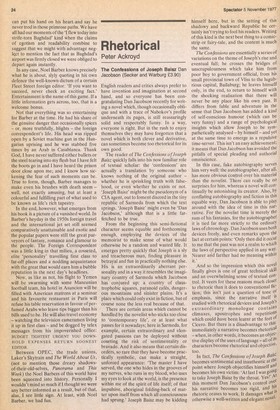Rhetorical
Peter Ackroyd
The Confessions of Joseph Balsz Dan Jacobson (Secker and Warburg E3.90) English readers and critics always prefer to have invention and imagination at second hand, and so everyone has been congratulating Dan Jacobson recently for writing a novel which, though occasionally oblique and with a trace of Nabokov's profile underneath its pages, is still reassuringly solid and respectably funny. In a way, everyone is right. But in the rush to enjoy themselves they may have forgotten that a novel which is both clever and derivative, can sometimes become too rhetorical for its own good.
The reader of The Confessions of Joseph Bain quickly falls into his now familiar role of textual scholar: the 'confessions' are actually a translation by someone who knows nothing of the original author — whether he is sprinkling truth with falsehood, or even whether he exists or not. 'Joseph Baisz' might be the pseudonym of a CIA agent, out to foment discord in the tiny republic of Sarmeda from which the text springs, 'Joseph Baisz' might even be 'Dan Jacobson,' although that is a little farfetched to be true.
From the beginning this semi-fictional character seems equable and forthcoming enough, employing the devices of the memoirist to make sense of what would otherwise be a random and wasted life. It emerges pretty quickly that Joseph is a sly and treacherous man, finding pleasure in betrayal and fun in practically nothing else. His is an extraordinarily aberrant personality and in a way it resembles the imaginary country of Sarmeda which Jacobson has conjured up: a country of claustrophobic squares, paranoid cafés, dangerous mountains and sinister plains. It's a place which could only exist in fiction, but of course none the less real because of that.
There are certain areas which cannot be handled by the novelist who sticks too close to 'contemporary life', or at least what passes for it nowadays; here in Sarmeda, for example, certain extraordinary and elongated passions can be deployed without courting the risk of sentimentality or bravado. And it also means that certain disorders, so rare that they have become practically symbolic, can make a straight, unforced appearance: 'The master I have served, the one who hides in the grooves of my nerves, who runs in my blood, who uses my eyes to look at the world, is the presence within me of the spirit of life itself; of that impulsive, aboriginal folding-back of matter upon itself from which all consciousness had sprung.' Joseph Baisz may be kidding himself here, but in the setting of this shadowy and backward Republic he certainly isn't trying to fool his readers. Writing of this kind is the next best thing to a comicstrip or fairy-tale, and the content is much the same.
The Confessions are essentially a series of variations on the theme of Joseph's rise and eventual fall; he crosses the bridges of unscrupulousness which take him from poor boy to government official, from his small provincial town of Vliss to the lugubrious capital, Bailaburg; he leaves himself only, in the end, to return to himself with the shocking realisation that there will never be any place like his own past. It differs from fable and adventure in the sense that Dan Jacobson has added a kind of self-conscious humour (which can be very funny) and a range of psychological insights which allow Joseph to be sympathetically analysed — by himself — and yet at the same time to emerge as a repulsive tune-server. This isn't an easy achievement; it means that Dan Jacobson has avoided the pitfalls of special pleading and authorial omniscience.
In this case, fake autobiography serves him very well: the autobiographer, after all, has more obvious control over his material than the novelist. There' can really be ne surprises for him, whereas a novel will continually be astonishing its creator. Also, by conflating autobiography and fiction in this equable way, Dan Jacobson is able to play around with the idea of time in this narrative. For the novelist time is merely the sum of his fantasies, for the autobiographer it is tied far more strictly to the ordinary laws of chronology. Dan Jacobson uses both devices freely, and even remarks upon the fact at certain points: 'Only then did it occur to me that the past was not a realm to which the laws of perspective applied in any way. Nearer and farther had no meaning within it.' And so the impression which this novel finally gives is one of great technical skili and an overwhelming sense of textual control. It veers for these reasons much closer to rhetoric than it does to conventional fiction; this isn't just a question of tone or emphasis, since the narrative itself is studied with rhetorical devices and Joseph's extraordinary monologue contains climaxes, apostrophes and repetitions which could have been learnt at the feet of Cicero. But there is a disadvantage to this: immediately a narrative becomes rhetorical —when, in other words, it becomes an objeetive display of the uses of language — all of irS characters become rhetorical and objective, too.
In fact, The Confessions of Joseph Bolsi becomes sentimental and inauthentic at the point where Joseph objectifies himself und becomes his own victim: 'At last I was going to take Joseph Baisz by the throat. Yes!' At this moment Dan Jacobson's control over his narrative becomes too rigid, and his rhetoric ceases to work. It damages what is otherwise a well-written and elegant novel.


































 Previous page
Previous page